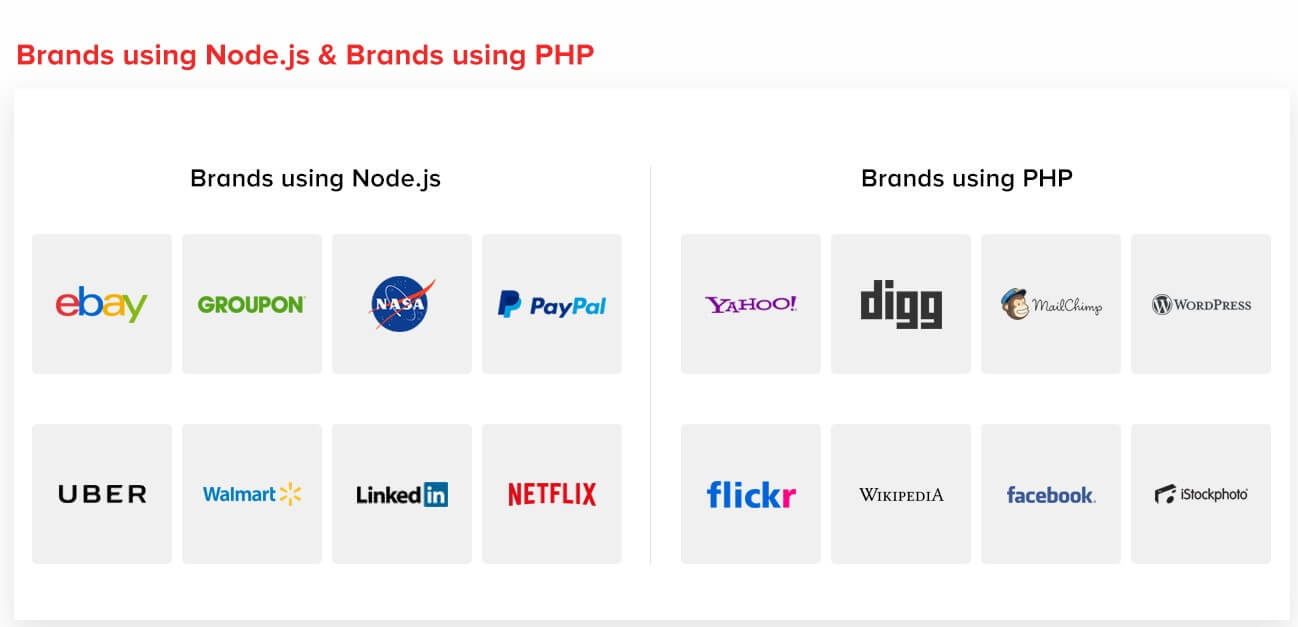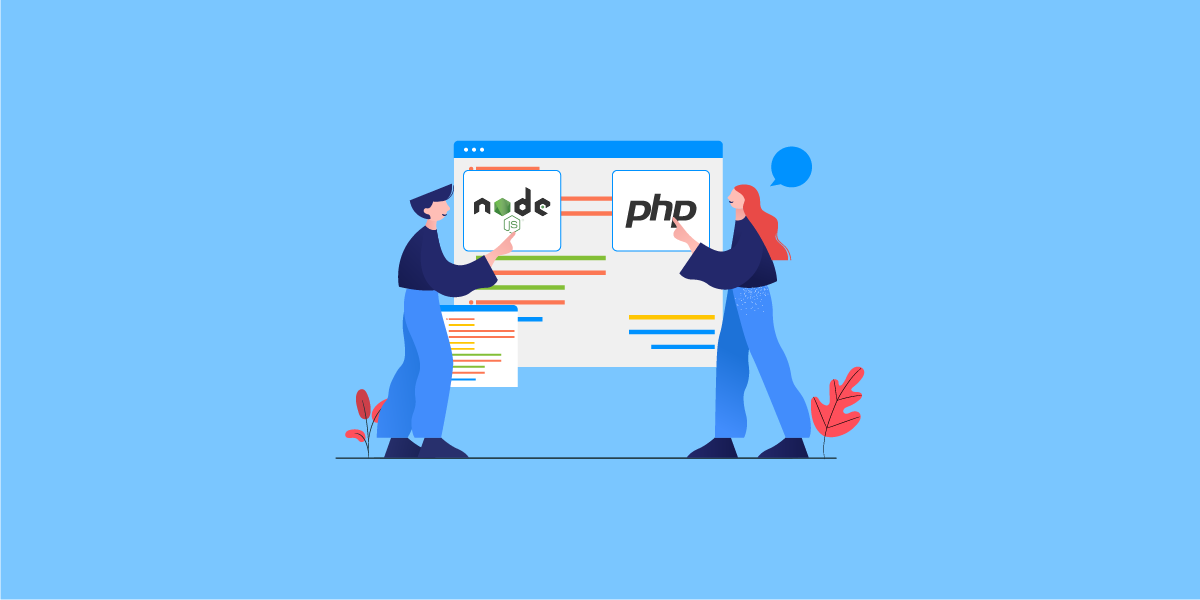Node.js vs PHP: Which is the Best Server Side Environment
Node.js vs PHP has joined the list of famous which is better debates, frequently making rounds in the mobile application development industry.
A debate that was never even into existence has today become a classic standoff in the mobile app development and web app development world, with developers struggling to make a choice between both environments.
It all started when Google V8 JavaScript Engine was launched and JavaScript started entering the backend development domain. And in only a few days, Node.js was prepared to become the best JavaScript framework of both the time and for the time to come.
Table of Content:
- Node.js vs PHP: How Does the Two Environments Stack Up Against Each Other
- Node.js – Pros and Cons
- PHP – Pros and Cons
- Brands Behind Both the Environments
- When to Use Node.js
- When to Use PHP
And now, with both the environments making advancements – Node.js with its Node.js 13 version offering improved performance, accessibility to new languages, and much more and PHP with its recently launched PHP 7.4 version providing advantages like preloading to improve performance and array functions for cleaner one-liner functions; the debate on which environment is the best has only become more serious for the mobile app development company using both for the creation of web apps and mobile app development.
Through this article, we will bring an end to the debate. By the time you finish this article, you would have arrived at a standstill on which Environment is ideal for your next app project – PHP vs Node.js.
Without further stalling, let us get straight to the factors that separates Node.js from PHP –
Node.js vs PHP: How Does the Two Environments Stack Up Against Each Other
There are a number of factors on which we can compare the two environments. Let us look at the factors and compare which out of PHP vs Node.js is coming out as a winner.
Speed and Performance
When it comes to look into PHP vs Node.js performance, the former offers a lot more reliable and stable performance.
However, when you compare both the environments on the basis of speed, you will find that Node.js beats PHP in the PHP vs Node.js battle. With the reason behind the high speed being –
- Continued Server Connection
- Callback functions which process multiple requests at the same time
- Speed Friendly V8 Engine
Development
When a developer codes on PHP, the experience is a lot faster and simpler as compared to Node. Js as there is zero need to include converters or compilers. The language established an easy connection to the SQL database and has no hosting limitations.
On the other hand, Node.js is a lot more complicated. The deployment of frameworks and applications in the case of Node calls for a much more complex preparation and server infrastructure.
So, the winner of node.js vs php comparison in terms of development is PHP.
Database
PHP operates well with a MySQL database while offering support to a range of different database versions like Postgresql and MariaDB. The code works well with databases irrespective of the engines utilized.
Node.js has different libraries for accessing SQL. It also uses JSON to interact with a new form of NoSQL databases.
While even a PHP project can be configured for supporting JSON, it is just a lot more convenient to use JavaScript as you get one code for both server and browser.
Hosting
PHP language is supported by a number of hosting services as compared to Node.js which comes with a lot less number of hosting services. This makes the integration and deployment of PHP a lot easier than Node, which calls for a virtual server having SSH access for running applications.
Practical Application
Node.js can be used in a number of places including multithreaded apps, web apps, browsers, game servers, etc. However, PHP is mostly used for web oriented applications in the form of different PHP frameworks.
Evolution of the Environment
PHP language is on a constant track of development and updates. The development team of the language always comes up with new concepts and features for providing a high execution speed.
Node.js is on a constant development route as well. The platform also comes with one additional benefit. It consists of all the modern functions in one distribution, where there is no fragmentation as such. This comes as a huge benefit for mobile app development companies who have to waste zero time on the reworking of the code.
An article talking about the comparison of Node vs PHP would remain incomplete until we talk about the various advantages and disadvantages that come associated with both the environments.
Our next section will talk about the benefits and limitations of both the environment, starting with the Node.js’s pros and cons.
Node.js – Pros and Cons
Pros
Fast Backend Solution
The one point that gets the JavaScript framework points ahead of the PHP vs Node.js war is that the framework can be used to service numerous concurrent events. Using Node.js The developers can easily make scalable solutions which maximizes the CPU usage and computer memory as they service different requests.
One Language
As expected from a JavaScript framework, Node.js is also a server-side environment which gives a complete range of benefits that a developer expects from scripting language across the app development stack. When you use one language for both the back-end and frontend development of an app, the resulting product is usually one with minimal bugs and better functions.
More Flexibility
When we talk about app development with Node.js, there are very limited dependencies and guidelines. There are no specific rules asking developers to choose a set architecture or pattern, which gives them access to over hundreds of different modules.
Apart from these, there are a number of pros that are a part of Node.js, such as – Being identical to JS, it is a lot easier to learn Node, it is ideal when working with large files.
Cons
Not ideal for Intensive Apps
The framework is not ideal for handling of intensive CPU activities such as editions of graphics, generation of audio and videos, etc. The applications made by Node are a lot more responsive, which makes it difficult to develop graphics-centric apps.
The Node Environment is Still a Little Immature
Along with these, one point that Node.js like some of the other JavaScript frameworks suffer from is the usage of a complicated code structure.
With this covered, let’s see what are PHP’s pros and cons in the development arena.
PHP – Pros and Cons
Pros
Robust Code
The environment comes with a strong code base with platforms like – Joomla, WordPress, and Drupal, which enables developers and Entrepreneurs reap the benefits of Rapid Application Development. One can develop e-commerce websites in minutes with the help of PHP. This also makes PHP ideal for the development of CMS (Content Management System).
Exact Solution
Irrespective of where the PHP is running – server or platform – it always offers a precise app development solution. This makes it a lot easier for small companies to integrate, develop, share, and manage apps with no knowledge of SSH console commands.
Web Offerings
PHP came into existence for working efficiently on the web with functionalities to manage HTML. So, for developers who wish to avoid creating an overload of the client side, when creating a CMS (Content Management System), PHP comes as a highly beneficial solution.
Apart from these, there are a number of advantages that PHP comes with, such as – Huge community support, portability, support of hosting services.
Cons
Poor Manageability of Code
As covered in our ASP.Net vs PHP blog, the latter gives the developers the freedom to combine HTML with the language syntax, which makes it even harder for them to extend their PHP apps with the new functionality. Also, it has become even more difficult to manage the codes with such a huge code base: something that JavaScript frameworks seldom face.
Client-Server Model Slow
Because the client-server model of PHP is a lot more outdated than Node, it is also a lot slower.
In addition to these two disadvantages, PHP also does not separate business logic and views. Because of this, it gets difficult to add new functions to the codebase.
Now that you have seen the advantages and disadvantages that both Node.js and PHP come with, it is important to understand that while the pros & cons combination of one environment would be suitable for one business, chances are that the combination of the same environment won’t work for the other business. Meaning, knowing different PHP vs Node.js benchmarks is not enough; you must also be familiar with different scenarios they are effective in.
Something that we will cover in this article, but after taking a look at the brand evangelists of both the environments.
Brands Behind Both the Environments

With this, we have now looked into what differentiates Node.js with PHP, what are the associated pros and cons of both the environments and the brands that have used both the environments for their development process. The next and last stage deals with the factor that every business is concerned with – When to use which Environment.
Node.js – When to Use
Node.js is the right option for your development needs when:-
- Using Software stacks like Mean (MongoDB, Express.js, AngularJS, and Node.js)
- Building single page applications or real-time apps like instant messaging apps and collaborative applications.
- Working with frontend development technologies like jQuery, Backbone.js, Ember.js, AngularJS, Reactjs, etc.
- Integrating IoT into your development process.
PHP – When to Use
The answer to whether to choose Node.js or PHP is the latter when:-
- Working with software stack such as LAMP (Linux, Apache, MySQL, and PHP).
- Developing solutions using CMS’s like Drupal, WordPress, and Joomla.
- Building standardized solutions like news sites, web portals, blogs, or landing pages.
- Using servers like MySQL, MariaDB, SQL, Oracle, Sybase, and Postgresql.
In the end, the final choice between Node.js vs PHP comes down to the type of application you are planning to develop, what the client requirements are related to hosting, and lastly how soon do you have to send the app.
In case your client is searching for some standardized solution having extensive hosting support, such as a CMS (Content Management System), go with PHP. Otherwise, if they are looking for one page apps, real-time mobile app development and collaboration apps, go with the popular JavaScript framework.
But, in case you are still confused what to pick – Node.js vs PHP, contact our app developers today!

strategies your digital product..



